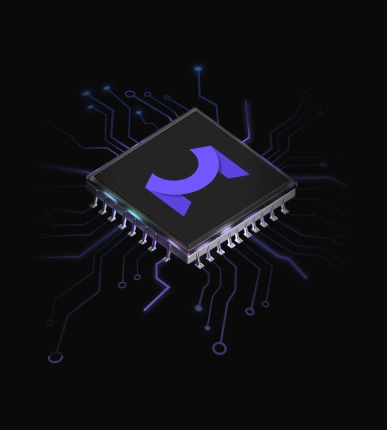MeshLib Supercharges Your Computational Efficiency
Geometry Algorithms Engineered to Revolutionize








Why MeshLib SDK?

Seamless Compatibility
MeshLib's native C++ core and APIs for C, C#, and Python enable seamless integration into AI pipelines and effortless cross-platform interoperability.

Speed and Performance
Our algorithms run up to 10x faster on average than other SDKs on the market. For example our 3D boolean surpasses any other SDK in terms of speed and quality.

Efficient Design
A modern architecture with GPU-accelerated algorithms and CUDA support for maximum scalability and speed.

Fully Cross-Platform
Windows, macOS, Linux, and WebAssembly support.
Developer-Centric Approach

Quick, Responsive Support

Flexible Integration

Comprehensive Toolbox

Speed and Performance

Seamless Compatibility

Efficient Design

Fully Cross-Platform




Fully Cross-Platform
Developer-Centric Approach

Quick, Responsive Support

Flexible Integration

Efficient Design

Developer-Centric Approach

Quick, Responsive Support

Flexible Integration

Comprehensive Toolbox

Our innovative algorithms

Mesh Boolean

Mesh Offsetting

Mesh Healing
Applications
Solution
Boolean operations
Offset Function
Mesh Healing

Solution
Mesh Healing
Decimation and Offset
Boolean operations

Solution
Voxel-to-Mesh Conversion
Mesh Healing
Boolean operations
Decimation and Offset

Solution
CT Reconstruction and Volume Rendering
Iso-value Adjustment
Voxel-to-Mesh Conversion
Mesh Healing

Solution
Global Registration and Alignment
Point Cloud Cleanup
Point Sampling and Triangulation
Mesh Healing

Start Your Journey with MeshLib
MeshLib SDK offers multiple ways to dive in — from live technical demos to full application trials and hands-on SDK access. No complicated setups or hidden steps. Just the tools you need to start building smarter, faster, and better.

What our customers say
Thomas Tong
Founder, Polyga

Gal Cohen
CTO, customed.ai

Mariusz Hermansdorfer
Head of Computational Design at Henning Larsen Architechts

HeonJae Cho, DDS, MSD, PhD
Chief Executive Officer, 3DONS INC

Ruedger Rubbert
Chief Technology Officer, Brius Technologies Inc

News

Release v3.1.0.2

Visit us at AEEDC 2026

Release v3.0.9.196

Release v3.0.8.228

Live Coding Webinar: Building a Support Generator using MeshLib SDK

Visit us at Formnext 2025

Release v3.0.7.226

Release v3.0.6.229

Release v3.0.5.215

Release v3.0.4.121

Release v3.1.0.2

Visit us at AEEDC 2026

Release v3.0.9.196

Release v3.0.8.228

Live Coding Webinar: Building a Support Generator using MeshLib SDK

Visit us at Formnext 2025

Release v3.0.7.226

Release v3.0.6.229

Release v3.0.5.215

Release v3.0.4.121
Frequently Asked Questions
What is MeshLib?
MeshLib is an advanced software development library kit designed for 3D data manipulation, processing, and analysis. It offers a robust set of tools for meshes, point clouds and voxels, as well as conversion between various 3D data formats, making it ideal for industries such as engineering, manufacturing, and medical imaging.
Do you have documentation available for MeshLib?
Yes, comprehensive documentation is available for MeshLib, including tutorials, API references, and detailed guides to help users navigate its features and capabilities.
Can I try MeshLib SDK code directly?
Yes, you can! Use our Getting Started guides and explore code samples to kick off your evaluation. MeshLib is available for free on GitHub for evaluation and non-commercial use. Anyone can access, try, and install the open-source code. However, for commercial use or building products with MeshLib, a valid license is required.
What are the major algorithms of MeshLib?
MeshLib provides a wide range of algorithms, including mesh repair and optimization, decimation, freeform and Laplacian deformation, 3D Boolean operations, distance and collision detection, and point cloud processing. For a complete list of available alorithms, visit our features page.
Which 3D data formats does MeshLib support?
MeshLib supports a wide range of 3D data formats, including STL, OBJ, PLY, DICOM and others as well as point cloud formats such as PLY, XYZ, and E57. This ensures compatibility with various industry-standard tools and workflows.
Can MeshLib be integrated into custom applications?
Yes, MeshLib is highly extensible and can be integrated into custom applications. It provides an API for deep control over mesh manipulation and analysis, making it suitable for building specialized solutions for specific workflows.
What programming languages are supported by MeshLib?
MeshLib is primarily designed for use with C++ but also offers support for Python, C# and C through its API, enabling users to leverage its powerful functionalities in various programming environments.
What's the best way to start exploring the MeshLib SDK?
The best way to get started is by requesting a personalized demo. During the demo, we’ll showcase the key capabilities of MeshLib tailored to your specific needs. We’ll also discuss pricing options and provide comprehensive evaluation support to ensure a smooth onboarding experience.
What is the quickest way to try MeshLib in action?
The fastest way is to use MeshInspector, a fully-featured application built with the MeshLib SDK. It comes with a 30-day free trial, and you can contact us to extend the trial period if needed.
How is MeshLib SDK better compared to other libraries?
We’ve conducted detailed comparisons between MeshLib and other popular libraries to help you make an informed decision. Check out our blog post where we evaluate MeshLib’s performance in areas like 3D boolean operations and mesh simplification against alternative solutions.


